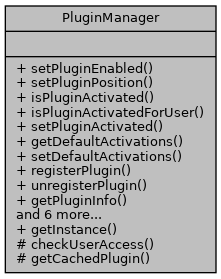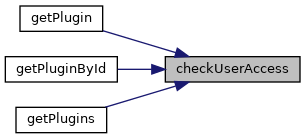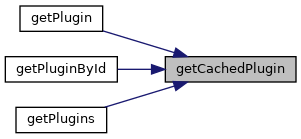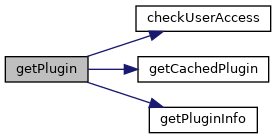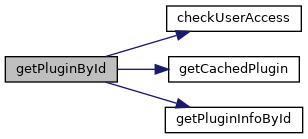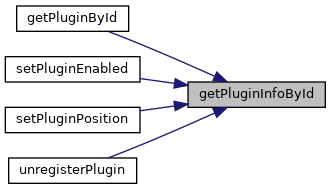|
| | setPluginEnabled ($id, $enabled) |
| |
| | setPluginPosition ($id, $position) |
| |
| | isPluginActivated ($id, $context) |
| |
| | isPluginActivatedForUser ($pluginId, $userId) |
| |
| | setPluginActivated ($id, $rangeId, $active, $context='sem') |
| |
| | getDefaultActivations ($id) |
| |
| | setDefaultActivations ($id, $institutes) |
| |
| | registerPlugin ($name, $class, $path, $depends=NULL) |
| |
| | unregisterPlugin ($id) |
| |
| | getPluginInfo ($class) |
| |
| | getPluginInfoById ($id) |
| |
| | getPluginInfos ($type=NULL) |
| |
| | getPlugin ($class) |
| |
| | getPluginById ($id) |
| |
| | getPlugins ($type, $context=NULL) |
| |
| | getPluginManifest ($plugindir) |
| |
◆ checkUserAccess()
| checkUserAccess |
( |
|
$plugin, |
|
|
|
$user |
|
) |
| |
|
protected |
Check user access permission for the given plugin.
- Parameters
-
| $plugin | plugin meta data |
| $user | user id of user |
◆ getCachedPlugin()
| getCachedPlugin |
( |
|
$plugin_info, |
|
|
|
$context = NULL |
|
) |
| |
|
protected |
Get instance of the plugin specified by plugin meta data.
- Parameters
-
| $plugin_info | plugin meta data |
| $context | context range id (optional) |
◆ getDefaultActivations()
| getDefaultActivations |
( |
|
$id | ) |
|
Returns the list of institutes for which a specific plugin is enabled by default.
- Parameters
-
◆ getInstance()
◆ getPlugin()
Get instance of the plugin specified by plugin class name.
- Parameters
-
| $class | class name of plugin |
◆ getPluginById()
Get instance of the plugin specified by plugin id.
- Parameters
-
◆ getPluginInfo()
Get meta data for the plugin specified by plugin class name.
- Parameters
-
| $class | class name of plugin |
◆ getPluginInfoById()
Get meta data for the plugin specified by plugin id.
- Parameters
-
◆ getPluginInfos()
| getPluginInfos |
( |
|
$type = NULL | ) |
|
Get meta data for all plugins of the specified type. A type of NULL returns meta data for all installed plugins.
- Parameters
-
| $type | plugin type or NULL (all types) |
◆ getPluginManifest()
| getPluginManifest |
( |
|
$plugindir | ) |
|
Read the manifest of the plugin in the given directory. Returns NULL if the manifest cannot be found.
- Returns
- array containing the manifest information
◆ getPlugins()
| getPlugins |
( |
|
$type, |
|
|
|
$context = NULL |
|
) |
| |
Get instances of all plugins of the specified type. A type of NULL returns all enabled plugins. The optional context parameter can be used to get only plugins that are activated in the given context.
- Parameters
-
| $type | plugin type or NULL (all types) |
| $context | context range id (optional) |
◆ isPluginActivated()
| isPluginActivated |
( |
|
$id, |
|
|
|
$context |
|
) |
| |
Get the activation status of a plugin in the given context. This also checks the plugin default activations and sem_class-settings.
- Parameters
-
| $id | id of the plugin |
| $context | context range id |
◆ isPluginActivatedForUser()
| isPluginActivatedForUser |
( |
|
$pluginId, |
|
|
|
$userId |
|
) |
| |
Get the activation status of a plugin for the given user. This also checks the plugin default activations and sem_class-settings.
- Parameters
-
| $pluginId | id of the plugin |
| $userId | id of the user |
◆ registerPlugin()
| registerPlugin |
( |
|
$name, |
|
|
|
$class, |
|
|
|
$path, |
|
|
|
$depends = NULL |
|
) |
| |
Register a new plugin or update an existing plugin entry in the data base. Returns the id of the new or updated plugin.
- Parameters
-
| $name | plugin name |
| $class | plugin class name |
| $path | plugin relative path |
| $depends | id of plugin this plugin depends on |
◆ setDefaultActivations()
| setDefaultActivations |
( |
|
$id, |
|
|
|
$institutes |
|
) |
| |
Set the list of institutes for which a specific plugin should be enabled by default.
- Parameters
-
| $id | id of the plugin |
| $institutes | array of institute ids |
◆ setPluginActivated()
| setPluginActivated |
( |
|
$id, |
|
|
|
$rangeId, |
|
|
|
$active, |
|
|
|
$context = 'sem' |
|
) |
| |
Sets the activation status of a plugin in the given context.
- Parameters
-
| $id | id of the plugin |
| $rangeId | context range id |
| $active | plugin status (true or false) |
| $context | context of plugin activation |
◆ setPluginEnabled()
| setPluginEnabled |
( |
|
$id, |
|
|
|
$enabled |
|
) |
| |
Set the enabled/disabled status of the given plugin.
Triggers a PluginDidEnable or respectively PluginDidDisable notification. The plugin's ID is transmitted as subject of the notification.
- Parameters
-
| $id | id of the plugin |
| $enabled | plugin status (true or false) |
◆ setPluginPosition()
| setPluginPosition |
( |
|
$id, |
|
|
|
$position |
|
) |
| |
Set the navigation position of the given plugin.
- Parameters
-
| $id | id of the plugin |
| $position | plugin navigation position |
◆ unregisterPlugin()
Remove registration for the given plugin from the data base.
- Parameters
-
The documentation for this class was generated from the following file:
